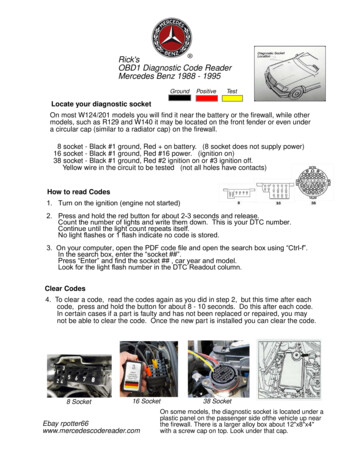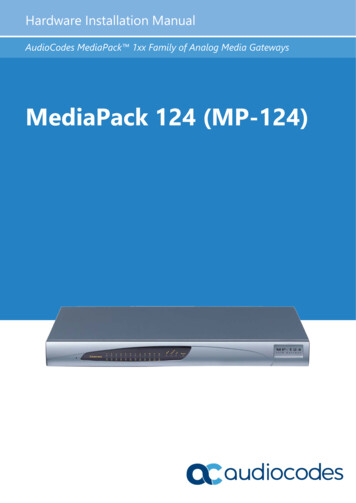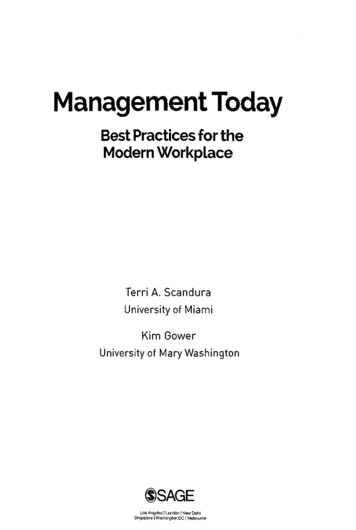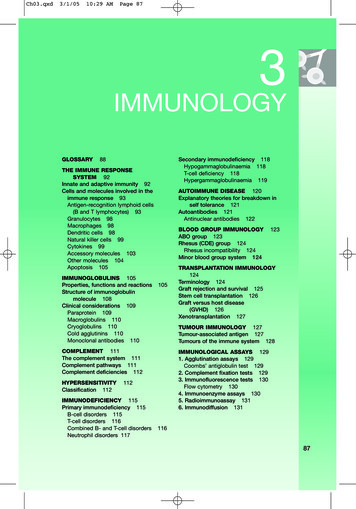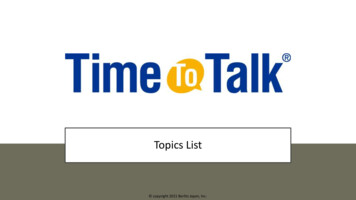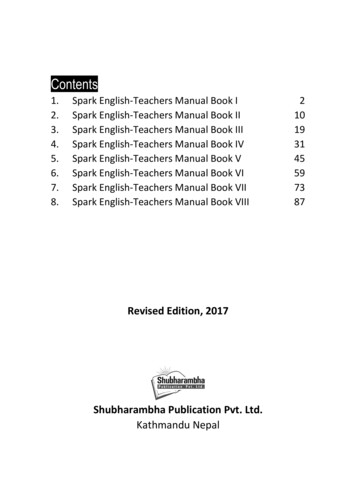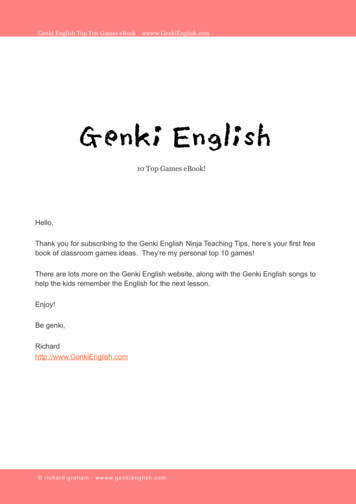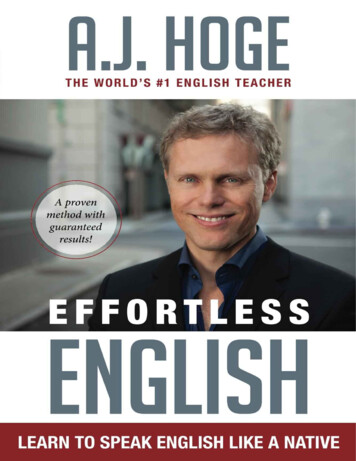
Transcription
English 124.009:Arguing about InterpretationsMonday/Wednesday/Friday 1:10 – 2:002462 Mason HallBrian S. MatzkeOffice: 3137 Angell HallOffice Hours: Mondays 3:00 - 5:00Email: bmatzke@umich.edu(Please allow for up to 24 hours for a response to any email)Departmental Course Description:This class is about writing and academic inquiry, with a special emphasis on literature. Goodarguments stem from good questions, and academic essays allow writers to write their waytoward answers, toward figuring out what they think. In this writing-intensive course, studentsfocus on the creation of complex, analytic, well-supported arguments addressing questions thatmatter in academic contexts. The course also hones students’ critical thinking and reading skills.Working closely with their peers and the instructor, students develop their essays throughworkshops and extensive revision and editing. Readings cover a variety of genres and often serveas models or prompts for assigned essays; the specific questions students pursue in essays areguided by their own interests.Section Description:Have you ever watched a movie or TV show with a friend and gotten into a debate, where one ofyou loved it and the other hated it, and as you discussed it you realized that you had radicallydifferent interpretations of the story—different points of emphasis, different ideas about theunderlying message, different standards by which you were evaluating it, etc.? This class is allabout those kinds of debates. Just about everything in our culture is open to interpretation.Consequently, the ability to develop smart, logically sound interpretations and the capacity toargue persuasively for those interpretations are highly valuable skills. In this class, we willexamine films and novels (as well as essays, poems, and short stories) in order to hone thoseanalytical and rhetorical skills. Our goal is not only to understand those stories better, but tothink more critically and write and speak more persuasively about the world around us. Workcommitments for this course will include reading, large- and small-group discussion, peerreviews and workshops of one another’s work, small-scale writing assignments, and severalextended essays.Required Texts: They Say, I Say by Gerald Graff and Cathy BirkensteinThe Sun Also Rises by Ernest HemingwayThe Turn of the Screw by Henry JamesBeloved by Toni MorrisonThe Hunger Games by Suzanne CollinsYou should also have a style or grammar guide such as The Little, Brown Essential Handbookfor Writers by Jane E. Aaron or The Elements of Style by William Strunk Jr. and E.B. White, orconsult an online style guide such as Grammar Girl (http://grammar.quickanddirtytips.com/)or The Purdue Online Writing Lab (http://owl.english.purdue.edu/).1
Work Commitments Paper 1: Movie Review. This paper should evaluate a film of your choosing and arguefor that evaluation. 5 pages. Paper 2: Close Reading. This paper should argue for a detailed, focusedinterpretation of The Sun Also Rises based on close reading. 6 pages. Paper 3: Comparative Analysis. This paper should argue that comparing and/orcontrasting The Turn of the Screw and Beloved yields a useful insight into one or bothnovels. 7 pages. Paper 4: Theory Paper. This paper should argue for an interpretation of TheHunger Games from a particular theoretical perspective. 7 pages. Written Peer Critiques. Critiques should identify both the strengths and theweaknesses of an essay. You should offer your overall impression of the work, tie yourcomments to specific examples from the essay, and make tangible suggestions forimprovement. One page, single-spaced. Participation. Participation in this course means actively engaging in discussion andcontributing your thoughts to workshops. Shorter homework assignments and in-classwriting assignments also constitute a significant portion of your participation grade.Participation does not simply mean attendance. Theory Presentation. This is a one-time presentation on a particular scholarlyapproach to the study of literature and culture. The presentation should be clear,entertaining, and informative.Assignment sheets with more detailed guidelines will be handed out for each of the papers, thepeer critiques, and the presentation. All written work should be typed in Times New Romanfont with one-inch margins on all sides. Papers should be double-spaced. Peer critiques shouldbe single-spaced. All papers should include page numbers and a title, but not a separate titlepage. Improperly formatted papers will not be accepted.GradesPaper 1Paper 2Paper 3Paper 4Peer CritiquesParticipationPresentationTotalGrades 15015020020080150701000931 – 1000900 – 930870 – 899831 – 869800 – 830770 – 799AAB BBC 731 – 769700 – 730670 – 699631 – 669600 – 6300 – 599CCD DDE2
Course Policies AttendanceAttendance will be taken at the beginning of each class by way of either a sign-in sheet ora pop quiz on the day’s readings. If you are late to class and miss the sign-in sheet orquiz, it is your responsibility to make sure that your attendance is recorded, either byapproaching me at the end of class or emailing me that same day.Students are allowed three unexcused absences without any consequences. More thanthree unexcused absences will lower your final grade by 1/3 of a letter grade peradditional absence. Absences will be excused only if you ask to be excused in advance. Iwill grant such an excuse when class conflicts with a religious holiday or on a case-bycase basis with regard to other events that make missing class unavoidable. I may askfor documentation to confirm the justification for the absence. Absences for medical orfamily emergencies are, of course, understandable and will be excused if acceptabledocumentation is provided.If you are late to class three times, that will count as one unexcused absence. Late Papers and Peer CritiquesLate Papers will incur a loss of 1/3 of a letter grade per class day late. However, asworkshoping drafts is an integral component of the course, late paper drafts will incur aloss of 1/3 of a letter grade per day late. I will offer extensions on papers on a case-bycase basis, but only if you speak with me prior to the due date.Late Peer Critiques will not be accepted for credit. Food and DrinkFeel free to eat or drink in class, so long as it is not loud or otherwise distracting and youkeep the classroom clean. Laptops, Cell Phones, MP3 Players, etc.Pretend this is an airplane and turn off all electronic devices before class begins. Pen and PaperRemember to always bring a pen and paper to class. DisabilitiesIf you would like accommodation for a disability, please contact me as soon as possible.Any information you give me will be treated as strictly confidential. I also encourage youto contact the office of Services for Students with Disabilities in order to obtain disabilityverification and assistance in determining reasonable accommodations. Their websitecan be found at: http://www.umich.edu/ sswd/.3
PlagiarismThe definition of and department policy about plagiarism are available online advising/plagNote.asp.Department policy states that if you plagiarize, you will fail the assignment and thecourse. In addition, your case will be sent to the Dean of Student Affairs, who will reviewthe case and may recommend further penalty. The Sweetland Writing CenterThe Sweetland Writing Center is an excellent resource for developing your writing. Theycan offer you expert one-on-one assistance at all stages of the writing process. Theiroffices are located in 1310 North Quad. Their website can be found at:http://www.lsa.umich.edu/sweetland. You can also call them at 734-764-0429 to makean appointment.4
Weekly ScheduleWeek 1:IntroductionsSept 4Introductions and course goalsSept 6Read: “‘The Lone Ranger’: Rip-roaring adventure meets dark political parable”“Lone Ranger is Johnny Depp's tribute to shitty superhero origin films”They Say, I Say Preface, Introduction, Chapter 1, Chapter 11Week 2:Sept 9NO CLASS—INDIVIDUAL CONFERENCES INSTEADDue: Idea for paper 1Sept 11Read: “‘Zero Dark Thirty’ Is Osama bin Laden's Last Victory Over America”“In Defense of ‘Zero Dark Thirty’”“Torture and Tough Questions”They Say, I Say Chapter 4Sept 13Read: “The Dark Knight Rises” by Dana Stevens“The Dark Knight Rises” by Peter TraversThey Say, I Say Chapter 6Due: Paper 1 rough draft (to CTools by the end of the day)Week 3:WorkshopsSept 16Workshops for ,Due: Peer critiquesSept 18Workshops for ,Due: Peer critiquesSept 20Close reading activity; Small group workshopsWeek 4:Sept 23Read: “Hills Like White Elephants”Due: Paper 1 final draft (hard copy in class and electronic copy to CTools)Sept 25Read: The Sun Also Rises pages 1-51Sept 27Read: The Sun Also Rises pages 52-102They Say, I Say Chapter 75
Week 5:Sept 30Read: The Sun Also Rises pages 103-146They Say, I Say Chapter 2Oct 2Read: The Sun Also Rises pages 147-205They Say, I Say Chapter 3Oct 4Read: The Sun Also Rises pages 206-247Due: Paper 2 rough draft (to CTools by the end of the day)Week 6:WorkshopsOct 7Workshops for ,Due: Peer critiquesOct 9Workshops for ,Due: Peer critiquesOct 11Logic activity; Small group workshopsWeek 7:Oct 14FALL STUDY BREAKOct 16Read: The Turn of the Screw pages 1-46Due: Paper 2 final draft (hard copy in class and electronic copy to CTools)Oct 18Read: The Turn of the Screw pages 47-87They Say, I Say Chapter 5Week 8:Oct 21Read: Beloved pages 1-56Oct 23Read: Beloved pages 57-113They Say, I Say Chapter 8Oct 25Read: Beloved pages 114-165They Say, I Say Chapter 10Week 9:Oct 28Read: Beloved pages 167-199Oct 30Read: Beloved pages 200-235They Say, I Say Chapter 9Nov 1Read: Beloved pages 236-275Due: Paper 3 rough draft (due to CTools by the end of the day)6
Week 10:WorkshopsNov 4Workshops for ,Due: Peer critiquesNov 6Workshops for ,Due: Peer critiquesNov 8Audience activity; Small group workshopsWeek 11:Nov 11Read: The Hunger Games pages 1-85Due: Paper 3 final draft (hard copy in class and electronic copy to CTools)Nov 13Read: The Hunger Games pages 86-194Nov 15Read: The Hunger Games pages 195-289Week 12:Nov 18Read: The Hunger Games pages 290-374Nov 20Presentations: Marxism, EcocriticismNov 22Presentations: Critical Race Theory, FeminismWeek 13:Nov 25Presentations: Disability Studies, Postcolonial criticismNov 27Movie: The Hunger GamesDue: Paper 4 rough draft (due to CTools by the end of the day)Nov 29THANKSGIVING BREAKWeek 14:WorkshopsDec 2Workshops for ,Due: Peer critiquesDec 4Workshops for ,Due: Peer critiquesDec 6Workshops for ,Due: Peer critiques7
Week 15:ConclusionsDec 9Genre activityDec 11Due:Paper 4 final draft (hard copy in class and electronic copy to CTools)8
English 124 Paper #1: Movie ReviewFor your first paper, you will be writing a review of a movie of your choice. Chose amovie that you have seen before and that you have easy access to. This should not bedifficult—if the movie is available on Blu-ray or DVD, there will almost certainly be acopy available at the Askwith Media Library or the Ann Arbor Public Library, or throughNetflix or another streaming service. I do not advise you to chose a film simply becauseyou like it, however. As the examples we read in class show, negative reviews can be justas well-written as positive reviews and are arguably even more fun to read and write.Some movie reviews are published before the movie is released, and are directed atreaders who are deciding whether or not they should see the movie. Some reviews arepublished after a movie is released and are directed at readers who are forming anopinion about the movie after they have seen it. Your review should be the second type.Do not try to avoid spoilers; analyze the film in its entirety.You can think of your argument as having three levels:Level 1: What is your evaluation of the movie? Is it good or bad? Smart or stupid?Important or trivial?Level 2: What is the basis for your evaluation? Does the movie have a political subtextthat you agree or disagree with? Does the plot make logical sense? Is it original or is itderivative? Does it have an emotional impact? (Note: These are just examples of thesorts of questions you should be asking as you think about your paper. This is not anexhaustive list of questions, nor should you necessarily try to answer all of thesequestions).Level 3: What is your evidence? You will need to include specific examples from the filmthat help your argument: descriptions of what things look like, summaries of the plotand/or of individual scenes, quotations from lines of dialogue, etc. You will need toanalyze those examples to show how they support your evaluation of the movie.I will be holding individual conferences with students on September 9. At thoseconferences, you must know what movie you will be writing on, know whether it will bea positive or negative review, and have some ideas for how you will make yourargument. A rough draft of the paper is due to CTools on September 13 by the end of theday. We will workshop those rough drafts the following week, and the final draft is dueon September 23.Length: 5 pagesIdea due: September 9Rough draft due: September 13Final draft due: September 23
English 124 Paper #2: Close ReadingThe second paper asks you to argue for an interpretation of The Sun Also Rises.Interpretation does not mean summary (though summarizing the work can be animportant part of developing your argument). Rather, interpretation means lookingbeyond the obvious and analyzing the meanings and ideas that are implicit in the work.Your paper should closely read the text so as to show how Hemingway’s languagecontributes to his meaning.This paper is only six pages long, which is not a lot of space in which to develop a solidliterary analysis, so you will probably be better off focusing your argument rathernarrowly. Consider honing in on a single character, location, motif, image, or scene,then come up with a claim about the role that that small element plays in the novel. Seethe “Five Ways of Looking at a Thesis” handout for ideas as to how you might want tostructure your argument.To practice close reading skills, bring detailed annotations of one page from chapters 1-6of the novel to class on September 25. These annotations can be informal and don’t needto be complete sentences. On September 27, bring a more polished, one-paragraph closereading of a passage from chapters 7-10. A provisional thesis statement is due in class onSeptember 30. An electronic copy of the rough draft is due to CTools by the end of theday on October 4. The final draft of the paper is due on October 16. You should bothturn a hard copy of the paper in to me at the beginning of class that day and post a copyto CTools.Length: 6 pagesAnnotations: September 25Close reading: September 27Thesis: September 30Rough draft due: October 4Final draft due: October 16
English 124 Paper #3: Comparative AnalysisThe third paper asks you to argue for an interpretation of The Turn of the Screw andBeloved viewed together. A significant component of this paper will be comparing andcontrasting the two novels, but a simple compare/contrast argument will not be enoughto succeed on this assignment. Rather than just making observations about how the twoworks are similar or different, the paper should argue that viewing these two novelsalongside one another yields a better understanding of them than could be achieved ifeither were read on their own.As with paper #2, your argument should be an interpretation of what the novelsthemselves are saying, and you should frame that argument in such a way that nooutside sources are necessary to make your point. Your evidence should be from thetexts themselves, and the paper should make its case by close reading passages from thetexts. This paper utilizes the same analytical skills as paper #2, but with two novelsinstead of one.A good place to start with this paper would be to think of an individual point ofcomparison that could lend the paper focus. This could be a character trait, a setting, animage, a theme, a feature of the authors’ writing style, or any other story element that isin some way present in both novels. Chose something about these novels that you findstriking or interesting and brainstorm how James and Morrison do it differently.Your paper should analyze both novels, but you should not feel the need to give bothnovels equal weight. In fact, it might be more useful to think about one as subordinate tothe other. Say you are interested in writing a paper about how the governess and Sethecompare to one another as maternal figures, and you have these two possible thesissentences: The governess and Sethe are both failed maternal figures who fail as caregivers inpart due to their lower social status, but The Turn of the Screw shows that failure,while Beloved focuses on the aftermath.By looking at the governess’s descent into madness in The Turn of the Screw, wecan better understand Sethe’s maternal failings in Beloved by seeing how successas a caregiver is tied to social status.Both of these theses make a similar point and are likely to use the same textual evidence,but the second one sounds a lot more interesting. The first one treats the two texts asequal, but the second one is using an analysis of The Turn of the Screw in order tofurther its analysis of Beloved. Also note how the second one more closely follows the“Magic Thesis Sentence” format.Length: 7 pagesRough draft due: November 1Final draft due: November 11
English 124 Paper #4: Theory PaperThe fourth paper asks you to argue for an interpretation of The Hunger Games from aparticular theoretical perspective.Literary theory is the study of what literature is and how it shapes and is shaped by theculture. It draws on ideas from philosophy, history, and the social sciences in order tointerpret literature more fully. There are many schools of literary theory, but six popularschools are: Marxism explores class conflict in literature and culture Ecocriticism explores humans’ relationship with nature Critical race theory explores the construction of race Feminism explores the construction of gender Disability studies explores illness, disability, and the construction of health Postcolonial criticism explores nationality, imperialism, and colonialismAll of these schools of criticism can inform a reading of The Hunger Games. Beforewriting your theory paper, however, you will research and present on one of these sixschools. You will present in a group with two other classmates, and the presentationswill need to take 20-25 minutes of class time. In those presentations, you need to: Discuss the history of your school of theory Explain the sorts of questions that your school asks about literature and culture,and the sorts of analyses they perform Provide at least three open-ended discussion questions about the school Present an interpretation of The Hunger Games from this theoretical perspective,including a close reading of one passage from the novel Point to two other relevant passages from the novel that the class can collectivelydiscuss and interpret Provide at least three open-ended discussion questions about how to interpretThe Hunger Games from this theoretical perspectiveLength: 7 pagesRough draft due: November 1Final draft due: November 11
English 124.019Books of the GrotesqueMonday/Wednesday 4:10 - 5:30Mason Hall 2469Dr. Brian S. MatzkeOffice: 1329 North Quad (inside the Sweetland Writing Center)Office Hours: Tuesdays 11:30 - 12:30 and Wednesdays 9:00 - 10:00Email: bmatzke@umich.eduDepartmental Course Description:This class is about writing and academic inquiry, with a special emphasis on literature.Good arguments stem from good questions, and academic essays allow writers to writetheir way toward answers, toward figuring out what they think. In this writing-intensivecourse, students focus on the creation of complex, analytic, well-supported argumentsaddressing questions that matter in academic contexts. The course also hones students’critical thinking and reading skills. Working closely with their peers and the instructor,students develop their essays through workshops and extensive revision and editing.Readings cover a variety of genres and often serve as models or prompts for assignedessays; the specific questions students pursue in essays are guided by their owninterests.Section Description:In this class, we will practice creating smart, logically sound interpretations of literarytexts and arguing persuasively for those interpretations. By practicing the craft ofdeveloping and arguing for interpretations of literary texts, our goal is not only tounderstand literature better, but to think more critically and write and speak morepersuasively about the world around us. We will examine five books, each of which are“novels” consisting of separate but interlocking short stories. Sherwood Anderson calledhis book “The Book of the Grotesque,” implying that the characters’ inability tocommunicate with one another made them somehow “grotesque.” To focus our analysis,this class will continually return to the questions, how do these grotesque stories workindividually, and how do they work together to create a sum that is greater than itsparts? Work commitments for this course will include reading, large- and small-groupdiscussion, peer reviews and workshops of one another’s work, small-scale writingassignments, and several extended essays.Required Texts: Winesburg, Ohio by Sherwood AndersonThree Lives by Gertrude SteinCane by Gene ToomerThe Martian Chronicles by Ray BradburyThe Joy Luck Club by Amy Tan1
Work Commitments Paper 1: Close Reading. This paper should argue for a detailed, focusedinterpretation of a story from Winesburg, Ohio based on close reading. 5 pages. Paper 2: Comparative Analysis. This paper should argue that interpretingstories by two different authors alongside one another yields a useful insight intoone or both stories. 6 pages. Paper 3: Theory Paper. This paper should argue for an interpretation of astory from a particular theoretical perspective. 7 pages. Paper 4: Research Paper. This paper should argue for an interpretation of astory and support that interpretation by engaging with outside sources. 7 pages. Written Peer Critiques . Critiques should identify both the strengths and theweaknesses of an essay. You should offer your overall impression of the work, tieyour comments to specific examples from the essay, and make tangiblesuggestions for improvement. One page, single-spaced. Participation. Participation in this course means actively engaging indiscussion and contributing your thoughts to workshops. Shorter homeworkassignments and in-class writing assignments also constitute a significant portionof your participation grade. Participation does not simply mean attendance. Theory Presentation. This is a one-time presentation on a particularscholarly approach to the study of literature and culture. The presentation shouldbe clear, entertaining, and informative.Assignment sheets with more detailed guidelines will be handed out for each of thepapers, the peer critiques, and the presentation. All written work should be typed inTimes New Roman font with one-inch margins on all sides. Papers should bedouble-spaced. Peer critiques should be single-spaced. All papers should include pagenumbers and a title, but not a separate title page. Improperly formatted papers will notbe accepted.GradesPaper 1Paper 2Paper 3Paper 4Peer CritiquesParticipationPresentationTotalGrades 150150200200100150501000970 – 1000931 – 969900 – 930870 – 899831 – 869800 – 830A AAB BB-770 – 799731 – 769700 – 730670 – 699631 – 669600 – 6300 – 599C CCD DDE2
Course Policies AttendanceAttendance will be taken at the beginning of each class by way of a sign-in sheet.If you are late to class and miss the sign-in sheet, it is your responsibility to makesure that your attendance is recorded by approaching me at the end of class.An excused absence is an absence that is due to an unavoidable commitment.These include religious observances, doctor’s appointments, travel for auniversity activity such as an athletic competition, and family emergencies suchas a hospitalization or death in the family. In the case of a religious observance oruniversity-related travel, you must notify me of the absence in advance in orderfor the absence to be marked as excused. In the case of a doctor’s appointment,university-related travel, or family emergency, you must provide documentationin order for the absence to be marked as excused.Unexcused absences are absences for all other reasons, including visitingrelatives, travel for personal reasons, performing volunteer work, feeling sick butnot going to the doctor, and meeting with your academic advisor.Students are allowed two unexcused absences without any consequences. Eachadditional unexcused absence will lower your final grade by ⅓ of a letter grade (so,an A would become an A-, an A- would become a B , and so on).If you are late to class three times, that will count as one unexcused absence. EmailMy email is bmatzke@umich.edu , but I strongly encourage students to speakwith me in person rather than via email.If you know that you will be absent from class for a reason that is covered by the“excused absences” policy, come to me in office hours or after class before the dayof the absence to inform me in person, and I will excuse the absence. If you areabsent due to an emergency, come to me come to me in office hours or after classat a later date with documentation of the emergency, and I will excuse theabsence. Do not inform me of an absence via email. If you are absent for a reasonthat is not covered by the “excused absences” policy, you do not need to informme at all. If you are absent from class for any reason, contact a classmate for thematerial you missed. Do not email me to ask what you missed in class.If you have a question about an assignment or a course policy, ask during or afterclass, or in office hours. If you have a longer question or would like feedback on apaper draft, come to my office hours, which do not require an appointment. Ifyou are unable to attend my regularly scheduled office hours, come to me afterclass to schedule an appointment to meet with me in my office at another time.3
PreparednessBefore the start of class you are expected to put away your phone, laptop, and anyother electronic devices, and take out a pen, notebook, the assignment due thatday (if any) and your copy of the books and/or papers to be discussed in classthat day. Not doing these things before 4:10 amounts to being late for class, andwill be marked as such on the attendance sheet. Using your phone during class ornot bringing your copy of the books and/or papers to be discussed to class thatday amounts to being absent and will be marked as such on the attendance sheet. Late AssignmentsPaper rough drafts must be uploaded to CTools by 5pm on the day that they aredue. The final grade on the paper will incur a loss of ⅓ a letter grade per day late(that’s per day--seven days a week).Paper final drafts must be turned in as a hard copy at the start of class and mustbe uploaded to CTools by 5pm on the day that they are due. The final grade onthe paper will incur a loss of ⅓ a letter grade per two days late (the penalty is moresevere for rough drafts because the workshop schedule depends on studentshaving time to read each others’ rough drafts).I will offer extensions on papers on a case-by-case basis, but only if you speakwith me prior to the due date.Late Peer Critiques will not be accepted for credit. DisabilitiesIf you would like accommodation for a disability, please contact me as soon aspossible. Any information you give me will be treated as strictly confidential. Ialso encourage you to contact the office of Services for Students with Disabilitiesin order to obtain disability verification and assistance in determining reasonableaccommodations. Their website can be found at: http://www.umich.edu/ sswd/ . PlagiarismThe definition of and department policy about plagiarism are available online advising/plagNote.asp .If you plagiarize, you will fail the course and your case will be sent to the Dean ofStudent Affairs, who will review the case and may recommend further penalty. The Sweetland Writing CenterThe Sweetland Writing Center can offer you expert one-on-one assistance at allstages of the writing process. You can schedule an appointment via their website:http://www.lsa.umich.edu/sweetland . You can also call them at 734-764-0429 .Their offices are located at 1310 North Quad .4
Weekly ScheduleWeek 1IntroductionsJan 7IntroductionsUNIT 1:CLOSE READINGWeek 2Winesburg, Ohio by Sherwood AndersonJan 12Read : “The Book of the Grotesque”; “Hands”; “Paper Pills”; “Mother”;“The Philosopher”; “Nobody Knows”; “Godliness”Due : Close reading annotations activityJan 14Read : “A Man of Ideas”; “Adventure”; “Respectability”; “The Thinker”;“Tandy”; “The Strength of God”; “The Teacher”; “Loneliness”Due : Close reading paragraphWeek 3Winesburg, Ohio by Sherwood AndersonJan 19No class -- Martin Luther King, Jr. DayJan 21Read : “An Awakening”; “Queer”; “The Untold Lie”; “Drink”; “Death”;“Sophistication”; “Departure”Due : Paper 1 thesis statement and outlineJan 23Due : Paper 1 rough draft due to CTools by 5pmWeek 4WorkshopsJan 26Workshops for , ,Due : Peer critiquesJan 28Workshops for , ,Due : Peer critiques5
UNIT 2:COMPARATIVE ANALYSISWeek 5Three Lives by Gertrude Stein and Cane by Gene ToomerFeb 2Read : Three Lives by Gertrude Stein (in its entirety)Due : Sma
6 Week 5: Sept 30 Read: The Sun Also Rises pages 103-146 They Say, I Say Chapter 2 Oct 2 Read: The Sun Also Rises pages 147-205 They Say, I Say Chapter 3 Oct 4 Read: The Sun Als
